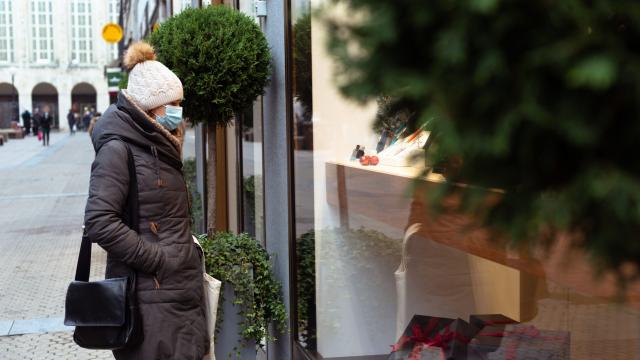As much as we miss the Before Times — when we didn’t have to wear masks and could go to crowded places and travel and throw parties and attend concerts and eat at the same table as acquaintances and strangers — those times aren’t coming back soon. No matter how good the news on vaccines might be, hang on to your masks.
Eventually we might be able to get rid of them, but don’t expect a return to a pre-pandemic normal in the next year or two. Here’s why:
We don’t know if the vaccine prevents transmission
So far, the efficacy data suggests that both Pfizer/BioNTech’s vaccine (the first COVID vaccine authorised for US use) and Moderna’s (likely to become the second) are good at preventing people from getting sick.
But we don’t know if the vaccine prevents you from getting infected with the virus, or if it just stops the infection from making you sick. It’s likely that it does both, but we just don’t have enough information to say.
So if you get the vaccine, you might still be able to spread the coronavirus to others. Even if you’re one of the lucky people who got the vaccine already, you should still wear a mask when you’re around other people.
Not everybody can get the vaccine
Right now, supplies are so limited that only a handful of people can get the vaccine. (It’s being given first to healthcare workers and residents of care facilities like nursing homes; other high risk folks will follow.)
But even when more doses are available, not everybody will get the vaccine. Some people might choose not to. Some might have a health-related reason why they cannot, such as an allergy to a vaccine ingredient.
And crucially, the vaccine is not authorised for children. The Pfizer vaccine is for people aged 16 and up, and the Moderna vaccine is for ages 18 and up. No manufacturer has yet completed large-scale trials on children yet.
So children and many teenagers will need to wear masks for a while yet. Even though kids don’t tend to become very ill, they can still spread the virus — probably less often than adults, but research is ongoing. Children make up more than 20% of the US population, so until they can be vaccinated, it will be difficult to impossible to reach herd immunity.
During this in-between time, when not everybody is vaccinated, expect gatherings and travel to be done with caution, with mask rules still in place. It’s unlikely anybody will be willing or able to check medical records at concerts or parties or family gatherings, so distancing and masks will likely still be required in many contexts while we wait for COVID cases to dwindle.
Masks are good, actually
Before COVID, there was something of a stigma to wearing a face mask out in public. I honestly wasn’t sure at first if people would be able to embrace the trend. But masks have been popular in Asia for years, and they’re not just for pandemics.
Masks help you avoid spreading your germs if you have a standard-issue cold or a flu, and that’s how they’ve long been used in Asia. Plus they can be handy in other situations, like keeping your nose warm when a scarf would just fall down.
So even if the vaccine rolls out quickly, and even if it turns out to be safe for everybody, and even if it proves effective at preventing transmission, we’ll be wearing masks for COVID prevention for at least a little while. And after that, they’ll still be handy to have around.

Leave a Reply
You must be logged in to post a comment.